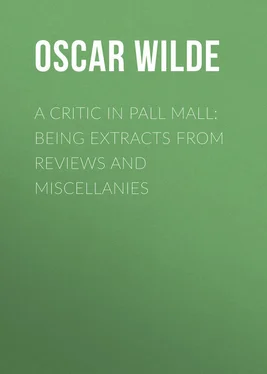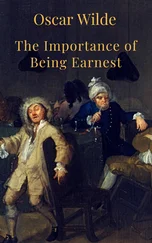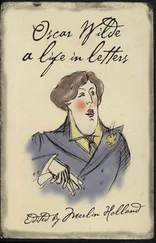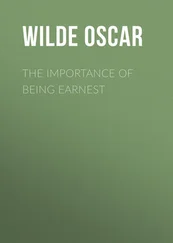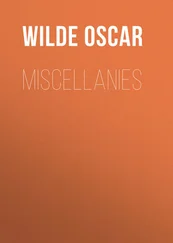Oscar Wilde - A Critic in Pall Mall - Being Extracts from Reviews and Miscellanies
Здесь есть возможность читать онлайн «Oscar Wilde - A Critic in Pall Mall - Being Extracts from Reviews and Miscellanies» — ознакомительный отрывок электронной книги совершенно бесплатно, а после прочтения отрывка купить полную версию. В некоторых случаях можно слушать аудио, скачать через торрент в формате fb2 и присутствует краткое содержание. Жанр: foreign_prose, на английском языке. Описание произведения, (предисловие) а так же отзывы посетителей доступны на портале библиотеки ЛибКат.
- Название:A Critic in Pall Mall: Being Extracts from Reviews and Miscellanies
- Автор:
- Жанр:
- Год:неизвестен
- ISBN:нет данных
- Рейтинг книги:5 / 5. Голосов: 1
-
Избранное:Добавить в избранное
- Отзывы:
-
Ваша оценка:
- 100
- 1
- 2
- 3
- 4
- 5
A Critic in Pall Mall: Being Extracts from Reviews and Miscellanies: краткое содержание, описание и аннотация
Предлагаем к чтению аннотацию, описание, краткое содержание или предисловие (зависит от того, что написал сам автор книги «A Critic in Pall Mall: Being Extracts from Reviews and Miscellanies»). Если вы не нашли необходимую информацию о книге — напишите в комментариях, мы постараемся отыскать её.
A Critic in Pall Mall: Being Extracts from Reviews and Miscellanies — читать онлайн ознакомительный отрывок
Ниже представлен текст книги, разбитый по страницам. Система сохранения места последней прочитанной страницы, позволяет с удобством читать онлайн бесплатно книгу «A Critic in Pall Mall: Being Extracts from Reviews and Miscellanies», без необходимости каждый раз заново искать на чём Вы остановились. Поставьте закладку, и сможете в любой момент перейти на страницу, на которой закончили чтение.
Интервал:
Закладка:
As for individual passages of beauty, nothing could be better than the wonderful description of the house of the Phœacian king, or the whole telling of the lovely legend of Circe, or the manner in which the pageant of the pale phantoms in Hades is brought before our eyes. Perhaps the huge epic humour of the escape from the Cyclops is hardly realized, but there is always a linguistic difficulty about rendering this fascinating story into English, and where we are given so much poetry we should not complain about losing a pun; and the exquisite idyll of the meeting and parting with the daughter of Alcinous is really delightfully told. How good, for instance, is this passage taken at random from the Sixth Book:
But therewith unto the handmaids goodly Odysseus spake:
‘Stand off I bid you, damsels, while the work in hand I take,
And wash the brine from my shoulders, and sleek them all around.
Since verily now this long while sweet oil they have not found.
But before you nought will I wash me, for shame I have indeed,
Amidst of fair-tressed damsels to be all bare of weed.’
So he spake and aloof they gat them, and thereof they told the may,
But Odysseus with the river from his body washed away
The brine from his back and shoulders wrought broad and mightily,
And from his head was he wiping the foam of the untilled sea;
But when he had thoroughly washed him, and the oil about him had shed,
He did upon the raiment the gift of the maid unwed.
But Athene, Zeus-begotten, dealt with him in such wise
That bigger yet was his seeming, and mightier to all eyes,
With the hair on his head crisp curling as the bloom of the daffodil.
And as when the silver with gold is o’erlaid by a man of skill,
Yea, a craftsman whom Hephæstus and Pallas Athene have taught
To be master over masters, and lovely work he hath wrought;
So she round his head and his shoulders shed grace abundantly.
It may be objected by some that the line
With the hair on his head crisp curling as the bloom of the daffodil, is a rather fanciful version of
ουλας ηκε κομας, ύακινθίνω ανθει ομοιασ
and it certainly seems probable that the allusion is to the dark colour of the hero’s hair; still, the point is not one of much importance, though it may be worth noting that a similar expression occurs in Ogilby’s superbly illustrated translation of the Odyssey , published in 1665, where Charles ii.’s Master of the Revels in Ireland gives the passage thus:
Minerva renders him more tall and fair,
Curling in rings like daffodils his hair.
No anthology, however, can show the true merit of Mr. Morris’s translation, whose real merit does not depend on stray beauties, nor is revealed by chance selections, but lies in the absolute rightness and coherence of the whole, in its purity and justice of touch, its freedom from affectation and commonplace, its harmony of form and matter. It is sufficient to say that this is a poet’s version of a poet, and for such surely we should be thankful. In these latter days of coarse and vulgar literature, it is something to have made the great sea-epic of the South native and natural to our northern isle, something to have shown that our English speech may be a pipe through which Greek lips can blow, something to have taught Nausicaa to speak the same language as Perdita.
The Odyssey of Homer . Done into English Verse by William Morris, author of The Earthly Paradise . In two volumes. Volume I. (Reeves and Turner.)
For review of Volume II. see Mr. Morris’s Completion of the Odyssey , page 65.
RUSSIAN NOVELISTS
Of the three great Russian novelists of our time Tourgenieff is by far the finest artist. He has that spirit of exquisite selection, that delicate choice of detail, which is the essence of style; his work is entirely free from any personal intention; and by taking existence at its most fiery-coloured moments he can distil into a few pages of perfect prose the moods and passions of many lives.
Count Tolstoi’s method is much larger, and his field of vision more extended. He reminds us sometimes of Paul Veronese, and, like that great painter, can crowd, without over-crowding, the giant canvas on which he works. We may not at first gain from his works that artistic unity of impression which is Tourgenieff’s chief charm, but once that we have mastered the details the whole seems to have the grandeur and the simplicity of an epic. Dostoieffski differs widely from both his rivals. He is not so fine an artist as Tourgenieff, for he deals more with the facts than with the effects of life; nor has he Tolstoi’s largeness of vision and epic dignity; but he has qualities that are distinctively and absolutely his own, such as a fierce intensity of passion and concentration of impulse, a power of dealing with the deepest mysteries of psychology and the most hidden springs of life, and a realism that is pitiless in its fidelity, and terrible because it is true. Some time ago we had occasion to draw attention to his marvellous novel Crime and Punishment , where in the haunt of impurity and vice a harlot and an assassin meet together to read the story of Dives and Lazarus, and the outcast girl leads the sinner to make atonement for his sin; nor is the book entitled Injury and Insult at all inferior to that great masterpiece. Mean and ordinary though the surroundings of the story may seem, the heroine Natasha is like one of the noble victims of Greek tragedy; she is Antigone with the passion of Phædra, and it is impossible to approach her without a feeling of awe. Greek also is the gloom of Nemesis that hangs over each character, only it is a Nemesis that does not stand outside of life, but is part of our own nature and of the same material as life itself. Aleósha, the beautiful young lad whom Natasha follows to her doom, is a second Tito Melema, and has all Tito’s charm and grace and fascination. Yet he is different. He would never have denied Baldassare in the Square at Florence, nor lied to Romola about Tessa. He has a magnificent, momentary sincerity, a boyish unconsciousness of all that life signifies, an ardent enthusiasm for all that life cannot give. There is nothing calculating about him. He never thinks evil, he only does it. From a psychological point of view he is one of the most interesting characters of modern fiction, as from an artistic he is one of the most attractive. As we grow to know him he stirs strange questions for us, and makes us feel that it is not the wicked only who do wrong, nor the bad alone who work evil.
And by what a subtle objective method does Dostoieffski show us his characters! He never tickets them with a list nor labels them with a description. We grow to know them very gradually, as we know people whom we meet in society, at first by little tricks of manner, personal appearance, fancies in dress, and the like; and afterwards by their deeds and words; and even then they constantly elude us, for though Dostoieffski may lay bare for us the secrets of their nature, yet he never explains his personages away; they are always surprising us by something that they say or do, and keep to the end the eternal mystery of life.
Irrespective of its value as a work of art, this novel possesses a deep autobiographical interest also, as the character of Vania, the poor student who loves Natasha through all her sin and shame, is Dostoieffski’s study of himself. Goethe once had to delay the completion of one of his novels till experience had furnished him with new situations, but almost before he had arrived at manhood Dostoieffski knew life in its most real forms; poverty and suffering, pain and misery, prison, exile, and love, were soon familiar to him, and by the lips of Vania he has told his own story. This note of personal feeling, this harsh reality of actual experience, undoubtedly gives the book something of its strange fervour and terrible passion, yet it has not made it egotistic; we see things from every point of view, and we feel, not that fiction has been trammelled by fact, but that fact itself has become ideal and imaginative. Pitiless, too, though Dostoieffski is in his method as an artist, as a man he is full of human pity for all, for those who do evil as well as for those who suffer it, for the selfish no less than for those whose lives are wrecked for others and whose sacrifice is in vain. Since Adam Bede and Le Père Goriot no more powerful novel has been written than Insult and Injury .
Читать дальшеИнтервал:
Закладка:
Похожие книги на «A Critic in Pall Mall: Being Extracts from Reviews and Miscellanies»
Представляем Вашему вниманию похожие книги на «A Critic in Pall Mall: Being Extracts from Reviews and Miscellanies» списком для выбора. Мы отобрали схожую по названию и смыслу литературу в надежде предоставить читателям больше вариантов отыскать новые, интересные, ещё непрочитанные произведения.
Обсуждение, отзывы о книге «A Critic in Pall Mall: Being Extracts from Reviews and Miscellanies» и просто собственные мнения читателей. Оставьте ваши комментарии, напишите, что Вы думаете о произведении, его смысле или главных героях. Укажите что конкретно понравилось, а что нет, и почему Вы так считаете.
